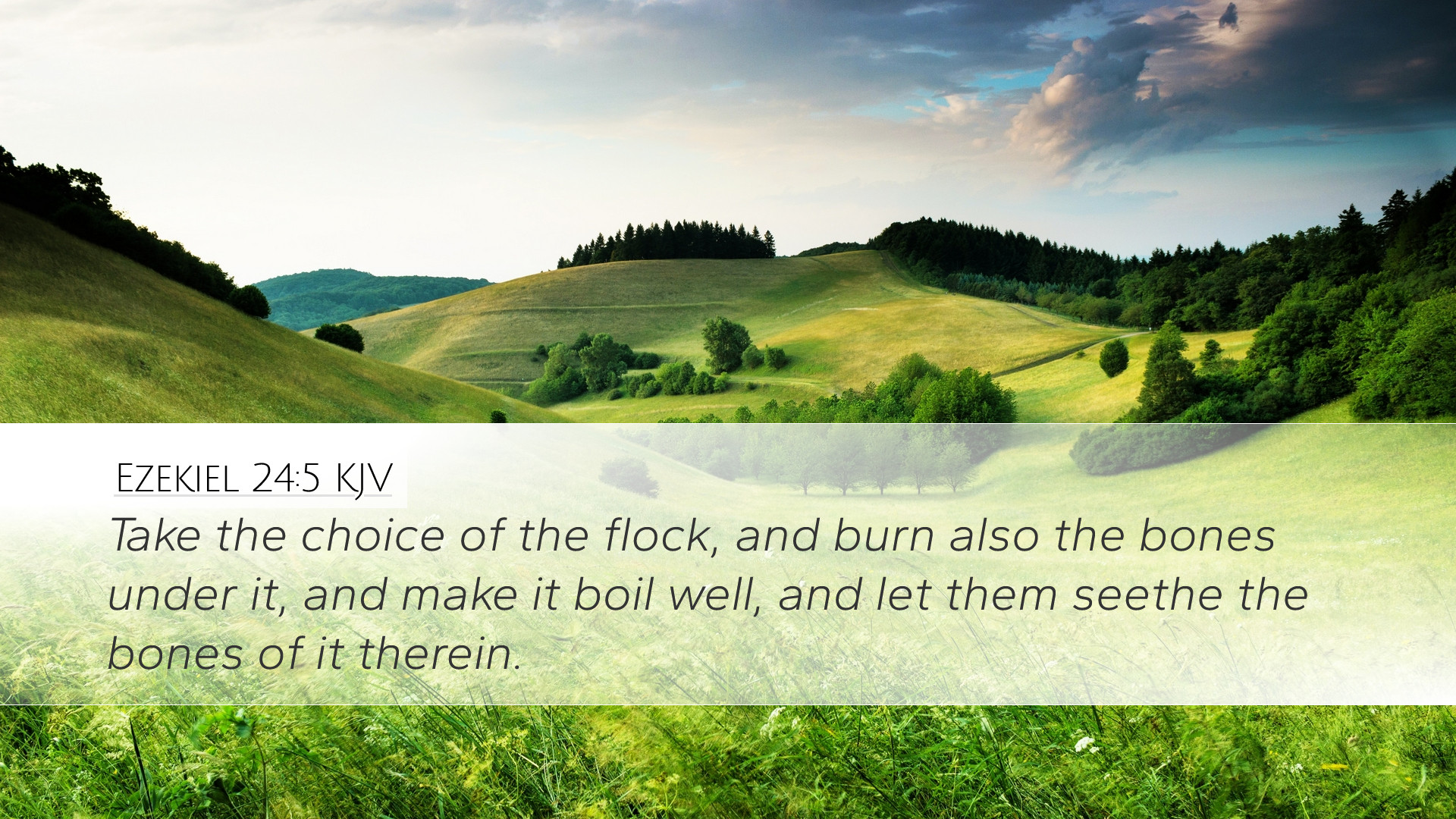Bible Commentary on Ezekiel 24:5
Verse Text: "Take the choice of the flock, and burn the bones under it, and make a sod; and let the whole be boiled in the vessels of it." (Ezekiel 24:5, KJV)
Introduction
This verse from the book of Ezekiel presents a vivid and disturbing imagery that serves as a metaphor for the judgment of Jerusalem. The prophetic nature of Ezekiel's message often employed symbolic acts and elements, making it crucial for pastors, students, theologians, and Bible scholars to delve deeply into its meaning.
Contextual Background
Ezekiel prophesied during the Babylonian captivity of the Israelites and his messages often contained strong prophetic warnings accompanied by dramatic actions. This particular chapter reflects a time of great turmoil for the people of Judah, as they faced impending destruction.
Several public domain commentators provide insights on the importance of the choice of the flock mentioned within the verse. It symbolizes not only judgment but the severe emotional toll of the impending destruction.
Commentary Insights
Matthew Henry
Henry outlines the profound symbolism in this act. He points to the "choice of the flock" as symbolic of the elite and the best that Jerusalem had to offer, emphasizing that even those deemed best would face judgment. This might also reflect God’s displeasure over the sinful acts of His people.
Henry interprets the "burning" of bones as representative of total destruction—indicating the severity of God's judgment. This method of cooking, or "boiling," is a metaphorical reference to the suffering that the people of Jerusalem would endure. The act is not just about physical demise but serves as a poignant illustration of the spiritual decay prevalent in Jerusalem.
Albert Barnes
Barnes highlights the sacrificial nature of this act, noting that in the Old Testament, various sacrifices involved the burning of precious parts of an animal. This connection serves to illustrate that what was once sacred is now being subjected to destruction due to the peoples' rebellion against God.
He posits that the “vessels” represent the means through which this destruction would be executed—the Babylonians serving as instruments of divine judgment. This points to a critical understanding that God’s purposes, though often shrouded in difficulty, are ultimately to fulfill His holiness and justice.
Adam Clarke
Clarke offers a more practical interpretation, suggesting that this verse portrays God’s will being executed through drastic measures. He emphasizes that the imagery of boiling speaks to the intensity and thoroughness of judgment—the necessity to purify and remove the iniquity from the land.
Additionally, Clarke notes that the depiction of cooking may serve as a spontaneous expression of the distaste God has for the sinful culture in Jerusalem. The boiling process serves to depict the fiery trials the people would face and how deep-rooted sins need equally intense measures for correction.
Theological Implications
This verse uncovers significant theological themes ranging from judgment, sacrifice, and purification. The use of the choice flock denotes an idea of selection, suggesting that God’s judgment will first fall on those in positions of privilege and power who are responsible for leading others into sin.
Moreover, the commentary highlights how divine judgment is not arbitrary; it stems from a deep-seated desire for restoration and repentance from the chosen people. Distinctive to Ezekiel's prophecies is the call to acknowledge their brokenness and return to covenantal faithfulness with God.
Applications for Today
For contemporary readers, especially for pastors and theologians, this verse underscores the seriousness of spiritual accountability. It serves as a reminder that even those who appear to be the pinnacle of faith within a community are not exempt from examination and judgment.
- Reflection on Leadership: Leaders in faith communities should reflect on their actions and the potential consequences of leading others away from God’s ways.
- Understanding Judgment: As much as this text details judgment, it emphasizes God’s hope for repentance and restoration.
- Perseverance in Trials: The image of boiling suggests that trials may refine believers, inviting them to trust God more deeply in times of abandonment and suffering.
Conclusion
Ezekiel 24:5 remains a powerful testament to the nature of God’s judgment interwoven with themes of sacrifice and purification. Public domain commentaries provide invaluable insights into the text, revealing the depth of meaning behind prophetic symbols. Understanding these symbols encourages earnest reflection and a call to faithful living in alignment with God’s will.


